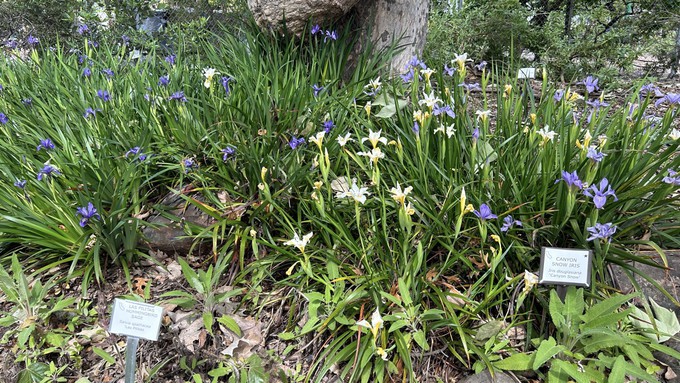
Get advice from local experts; see how they tackle spring tasks

Native Douglas irises -- as well as the 'Canyon Snow' cultivar irises -- are in bloom at the Fair Oaks Horticulture Center this week, which also happens to be California Native Plant Week. Kathy Morrison
Spring stirs thoughts of gardening – and lots of questions. Here’s your chance to get expert advice from Sacramento County master gardeners during a (hopefully) sunny midweek morning.
From 9 a.m. to noon Wednesday, April 17, the master gardeners will host an Open Garden event at Fair Oaks Horticulture Center in Fair Oaks Park – rain or shine. Admission and parking are free.
See the latest renovations and additions to this growing resource. Watch master gardeners as they tend to spring tasks and prepare for summer planting and rapid growth.
“For gardeners, there is no better time than spring to get inspired and tap into some practical and scientific know-how,” say the organizers. “Join Sacramento’s UC Master Gardeners to view new and established plantings and get locally relevant answers to your gardening questions.”
Master gardeners will be available to answer questions. Bring photos and samples of pests and/or problem plants, if desired (in zippered plastic bags). Got a garden mystery? These garden detectives are ready to help.
Stroll around the Hort Center and see what the master gardeners are busy doing this week. Ask questions! They love to talk gardening.
Some areas of interest:
BERRIES: Loganberries and ‘Baby Cakes’ raspberries are joining the berry garden. See how the various blueberry plants are doing.
HERBS: International culinary herb beds are making room for new annuals. Sniff the scented pelargoniums and the various lavenders. View edible flowers such as calendula and Johnny jump-ups.
VEGETABLES: Beds are being cleared of cover crops and revitalized with compost and fertilizer. As the soil warms, All-America Selections of tomatoes, flowers and vegetables will be planted.
ORCHARD: As the citrus harvest concludes, trees are being fertilized and pruned. Other sections of the orchard are being prepared for new trees including some in containers.
WATER-EFFICIENT LANDSCAPE: Subtropical varieties are being tried the Sacramento area in anticipation of climate change.
Fair Oaks Horticulture Center is located at 11549 Fair Oaks Blvd., Fair Oaks, south of the Fair Oaks Library.
Details and directions: https://sacmg.ucanr.edu.
Comments
0 comments have been posted.Sacramento Digs Gardening to your inbox.
Food in My Back Yard Series
April 29: What's (already) wrong with my tomato plants?
April 22: Should you stock up on fertilizer? (Yes!)
April 15: Grow culinary herbs in containers
April 8: When to plant summer vegetables
April 1: Don't be fooled by these garden myths
March 25: Fertilizer tips: How to 'feed' your vegetables for healthy growth
March 18: Time to give vegetable seedlings some more space
March 11: Ways to win the fight against weeds
March 4: Potatoes from the garden
Feb. 25: Plant a fruit tree now -- for later
Feb. 18: How to squeeze more food into less space
Feb. 11: When to plant? Consider staggering your transplants
Feb. 4: Starting in seed starting
Sites We Like
Garden Checklist for week of May 4
Enjoy this spring weather – and get gardening!
* Plant, plant, plant! It’s prime planting season in the Sacramento area. Time to set out those tomato transplants along with peppers and eggplants. Pinch off any flowers on new transplants to make them concentrate on establishing roots instead of setting premature fruit.
* Direct-seed melons, cucumbers, summer squash, corn, radishes, pumpkins and annual herbs such as basil.
* Harvest cabbage, lettuce, peas and green onions.
* In the flower garden, direct-seed sunflowers, cosmos, salvia, zinnias, marigolds, celosia and asters. (You also can transplant seedlings for many of the same flowers.)
* Plant dahlia tubers. Other perennials to set out include verbena, coreopsis, coneflower and astilbe.
* Transplant petunias, marigolds and perennial flowers such as astilbe, columbine, coneflowers, coreopsis, dahlias, rudbeckia and verbena.
* Keep an eye out for slugs, snails, earwigs and aphids that want to dine on tender new growth.
* Feed summer bloomers with a balanced fertilizer.
* For continued bloom, cut off spent flowers on roses as well as other flowering plants.
* Add mulch to the garden to maintain moisture. Mulch also cuts down on weeds. But don’t let it mound around the stems or trunks of trees or shrubs. Leave about a 6-inch to 1-foot circle to avoid crown rot or other problems.